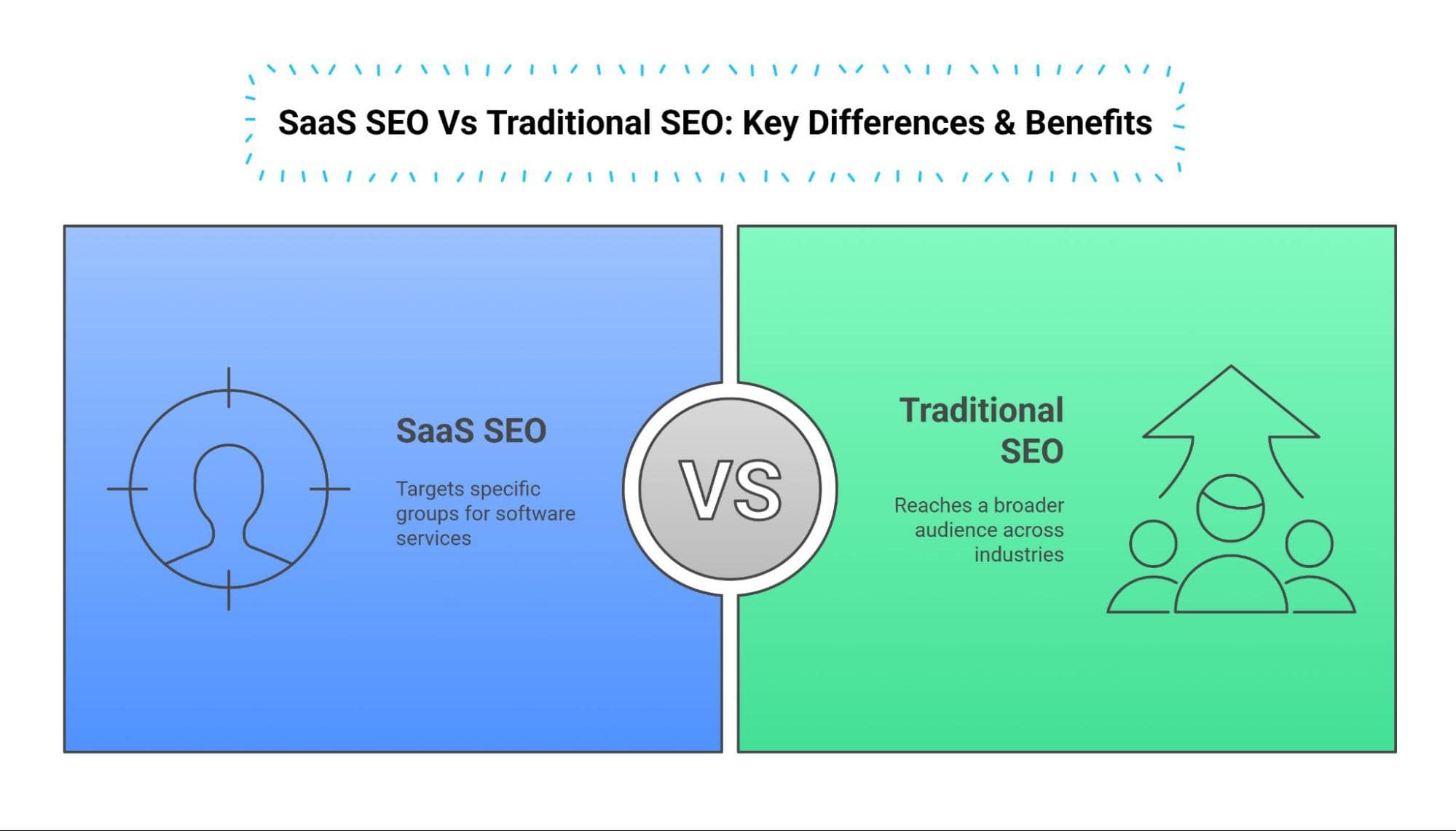If you own a business and want more people to find you online, you've probably heard of SaaS SEO and Traditional SEO. Both of these methods help your website show up better on search engines like Google.
SaaS SEO is about improving search results for software services, using specific keywords, and understanding what users want to attract customers. Traditional SEO focuses on bigger industries to improve keyword rankings and increase website visitors. SaaS SEO targets specific groups, while Traditional SEO reaches a bigger audience.
In this blog post, we'll dive into the nitty-gritty of SaaS SEO and Traditional SEO, highlighting their differences and helping you decide which strategy aligns best with your business goals.
Saas SEO Vs Traditional SEO: What Is It?

In the dynamic setting created for digital performance, it certainly becomes relevant to know the subtle differences that exist between SaaS SEO and traditional SEO. For this reason, this overview explains how unique each approach is and which strategies suit each approach to allow you to choose which best matches your objectives.
Understanding SaaS SEO
In today's digital world, SaaS companies need to stand out online. SaaS SEO is a key strategy to help them achieve this.
Definition of SaaS SEO
SaaS SEO is a special type of search engine optimization. It is designed for Software as a Service companies, meaning those offering their software solutions online. SaaS SEO will help these companies be more visible on search engines, which in return means more people will find and be able to make use of their software.
SEO Strategies for SaaS Businesses
SaaS businesses are unique. They usually work on a subscription model. This means customers pay regularly to use the software. SaaS products are also updated often. Their SEO strategies, therefore, have to be flexible due to these traits. They have to adapt changes as quickly as possible, targeting even particular needs of their customers in order to remain relevant and competitive.
Understanding Traditional SEO
Traditional SEO is one tried-and-tested strategy that, over time, has proven its worth in helping websites become more noticeable to search engines like Google. It especially uses a number of techniques to secure high ranks in search results for a site, which automatically brings it closer to the eyes of potential customers.
Definition of Traditional SEO
Traditional SEO is all about making websites easier to find on search engines. It includes:
- Content Optimization: Ensuring that website content is relevant and engaging.
- Keywords: Using specific words and phrases that people are likely to search for.
- Backlinks: Getting other sites to link to yours which makes your site more credible to search engines.
Traditional SEO: Industries and Businesses
Certain industries rely heavily on Traditional SEO to attract customers. These include:
- Retail: Stores use SEO to attract shoppers looking for specific products.
- Hospitality: Hotels and restaurants optimize their sites to appear in local and travel-related searches.
- Local Services: Businesses like plumbers or electricians use SEO to reach customers in their area.
Build Organic Traffic and Band
Traditional SEO is all about long-term strategies rather than quick wins in building a brand's reputation and visibility. In important things, it includes:
- Brand Building: Establishing a strong online presence that customers trust.
- Organic Traffic: This means driving targeted audiences naturally from search engines to your website without investing anything as advertising.
SaaS SEO Vs Traditional SEO: 4 Key Differences
When choosing the right SEO strategy, you need to understand how SaaS SEO is different from traditional SEO. A company's buyer's journey begins with its target audience. Now, deep dive into how aspects differ in each approach:
Target Audience and Buyer’s Journey
SEO strategies are very much about target audiences and buyer journeys. Let's take a look at how these differ between SaaS and Traditional SEO.
SaaS SEO:
- Focus on B2B and B2C Models: SaaS companies address both businesses and individual consumers as target customers for business organizations. This requires drafting messages that would be appealing to both parties.
- Shorter Sales Cycles: Sales cycles can also be much shorter with SaaS products. That is, the immediate results from demos or trials will make customers see if this software solves their pain.
Traditional SEO:
- Broader Audience: Traditional businesses tend to have a broader audience. They may target a wide range of customers with varying needs and interests.
- Longer Sales Cycles: Traditional products or services include longer sales cycles. It means that customers take their sweet time while making the purchasing decision, which often includes extra touchpoints.
Keyword Strategy
Keywords are at the heart of any SEO strategy. The keywords on your website serve to help the search engines locate your correct audience and understand what you are about. Let's explore how SaaS and traditional businesses approach keyword strategy differently.
SaaS SEO
- Focuses on product-specific keywords. These keywords are directly related to the software or service offered, helping potential customers find just what they need.
- Utilizes solution-based keywords. This approach targets users who are looking for solutions to specific problems that the SaaS product can solve.
Traditional SEO
- Emphasizes broader, industry-specific keywords. These keywords are less specific and cover a wide range of topics within an industry, attracting a larger audience.
- Uses generic keywords that appeal to a wide variety of potential customers, helping drive traffic from various segments of the market.
Content Strategy
Engaging your target audience requires a solid content strategy. Here's how SaaS and Traditional SEO differ in their approach:
SaaS SEO:
- It focuses on educational content and helps users understand complex products.
- Uses case studies to showcase success stories and build trust.
- Incorporates product demos to highlight features and benefits.
Traditional SEO:
- Relies on blog posts to drive traffic and provide useful content.
- Maintains relevance over time with evergreen content.
- Covers general industry news to keep the audience informed about trends.
Link Building and Authority
The key to improving search rankings is to build authority through links. SaaS SEO and Traditional SEO have distinct methods for achieving this:
SaaS SEO:
- Establishes partnerships with industry leaders and other companies to build authority.
- Publishes content in industry-specific publications to reach a targeted audience.
Traditional SEO:
- Gets links from different sources to build a unique backlink profile.
- Promotes sites with high authority and trust.
Benefits of SaaS SEO

There are unique advantages to SaaS SEO in today's fast-paced digital world. Let's explore how SaaS SEO can benefit your business.
Scalability and Adaptability
In today's rapidly changing market, SaaS SEO helps businesses adapt.
- Easily adjust strategies as markets evolve.
- Quickly scale efforts to match business growth.
- Respond swiftly to new opportunities or challenges.
Enhanced Targeting with Data-Driven Insights
Using data, SaaS SEO allows for precise targeting of potential customers.
- Identify specific customer needs and preferences.
- Tailor content to attract and engage the right audience.
- Improve marketing efforts based on data analysis.
Precision in Tracking and Measuring Success
SaaS SEO enables you to monitor the efficiency of your strategies more closely.
- Monitor key performance indicators (KPIs) with accuracy.
- Measure SEO's return on investment regarding business objectives.
- Continuously refine tactics based on detailed reports.
Benefits of Traditional SEO
The following are a few key advantages of traditional SEO for businesses looking to enhance their online presence:
Brand Visibility Over Time
You can keep your brand visible online with traditional SEO for quite some time.
- It gains more trust from the search engines, hence improving website ranking.
- Ensures consistent traffic to the website over time.
- Helps maintain a steady presence in search results.
Broad Reach Across Various Customer Segments
Any business must reach a wide audience. Traditional SEO can help achieve this.
- Enables targeting of diverse customer groups.
- Opens doors to both local and global audiences.
- Increases chances of reaching potential customers across the web.
Established Techniques and Strategies with Proven Results
With years of practice, Traditional SEO methods have shown success.
- Utilizes time-tested strategies that are effective.
- Offers clear guidelines and best practices to follow.
- Measures and analyzes results to improve them.
Challenges and Considerations
Discussion in this context, therefore, needs to relate to the choice between SaaS SEO and Traditional SEO. It is in understanding each of these approaches that challenges are found, and hence knowing such might be helpful in informing decisions by businesses.
SaaS SEO Challenges
SaaS SEO is fast-paced and requires constant attention. Here are some key challenges:
- Rapidly Changing Market: The SaaS industry is always evolving, so staying ahead of competitors can be tough.
- Continuous Content Updates: Regular updates are crucial to keep content fresh and relevant.
- Innovation Demands: To stand out, continual innovation in strategies and tools is necessary.
Traditional SEO Challenges
A traditional SEO campaign faces several challenges:
- Slower Adaptation: Adapting to new trends and technologies can be slower, which may lead to missed opportunities.
- High Competition: Many markets are saturated, making it harder to achieve high rankings and visibility.
Conclusion
Which is better for your company SaaS SEO or Traditional SEO depends on your business goals. SaaS SEO allows scaling and targeted marketing for changing markets and client needs. Traditional SEO offers a solid foundation for long-term brand growth.
Each has its strengths and challenges, but combining elements from both can create a holistic SEO strategy for immediate and future business needs. The best SEO strategy adapts to industry changes while staying focused on business goals.
FAQs
SaaS SEO involves targeting a very niche market, normally focused on certain keywords involving software as a service. Most strategies for SaaS SEO involve methods for long-term customer retention and acquisition.
It really requires an understanding of the complex journey that would be taken by a software buyer and appropriate content to answer the particular needs and pain points such buyers would have. This is quite different from regular SEO, which might target wider audiences and wider industries.

